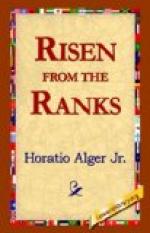“I will; but I will wait till the ‘Standard’ prints my first sketch, so that I can refer to that in writing to the ‘Argus.’”
“Perhaps you are right. There’s one advantage to not presenting yourself. They won’t know you’re only a boy.”
“Unless they judge so from my style.”
“I don’t think they would infer it from that. By the way, Harry, suppose my father could find an opening for you as a reporter on his paper,—would you be willing to accept it?”
“I am not sure whether it would be best for me,” said Harry, slowly, “even if I were qualified.”
“There is more chance to rise on a city paper.”
“I don’t know. If I stay here I may before many years control a paper of my own. Then, if I want to go into politics, there would be more chance in the country than in the city.”
“Would you like to go into politics?”
“I am rather too young to decide about that; but if I could be of service in that way, I don’t see why I should not desire it.”
“Well, Harry, I think you are going the right way to work.”
“I hope so. I don’t want to be promoted till I am fit for it. I am going to work hard for the next two or three years.”
“I wish I were as industrious as you are, Harry.”
“And I wish I knew as much as you do, Oscar.”
“Say no more, or we shall be forming a Mutual Admiration Society,” said Oscar, laughing.
Harry received a cordial welcome back to the printing office. Mr. Anderson asked him many questions about Mr. Vincent; and our hero felt that his employer regarded him with increased consideration, on account of his acquaintance with the great city editor. This consideration was still farther increased when Mr. Anderson learned our hero’s engagement by the “Weekly Standard.”
Three weeks later, the “Standard” published Harry’s sketch, and accepted another, at the same price. Before this latter was printed, Harry wrote a third sketch, which he called “Phineas Popkin’s Engagement.” This he inclosed to the “Weekly Argus,” with a letter in which he referred to his engagement by the “Standard.” In reply he received the following letter:—
“BOSTON, Jan., 18—,
“MR. FRANK LYNN,—Dear Sir: We enclose three dollars for your sketch,—’Phineas Popkin’s Engagement.’ We shall be glad to receive other sketches, of similar character and length, and, if accepted, we will pay the same price therefor.
“I. B. FITCH & Co.”
This was highly satisfactory to Harry. He was now an accepted contributor to two weekly papers, and the addition to his income would be likely to reach a hundred dollars a year. All this he would be able to lay up, and as much or more from his salary on the “Gazette.” He felt on the high road to success. Seeing that his young compositor was meeting with success and appreciation abroad, Mr. Anderson called upon him more frequently




